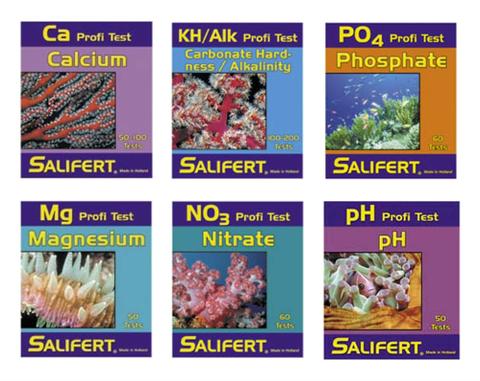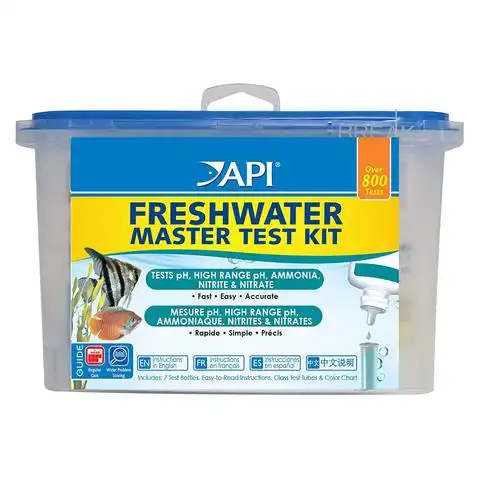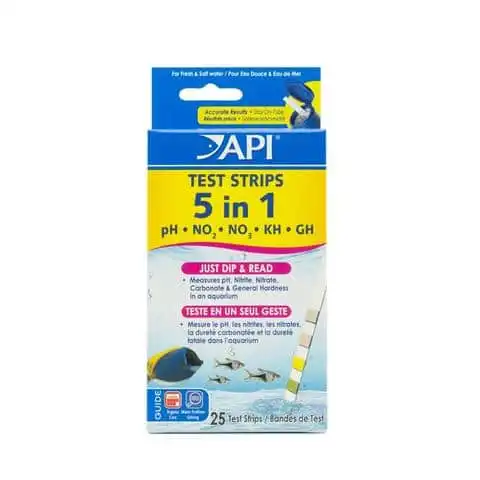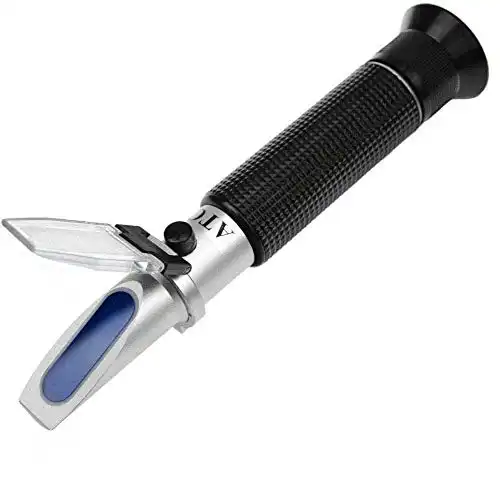Thank you for visiting! By the way… any links on this page that lead to products on Amazon and other stores/partners are affiliate links Aquarium Store Depot earns a commission if you make a purchase.
Are you struggling to find an reliable aquarium test kit?
In this blog, we share the best aquarium test kits, from test strips to digital readers.
With over 25 years of experience in the aquarium hobby, I’ve assisted countless clients, hobbyists, and readers like you in overcoming their water chemistry issues. I’ve personally tested these kits in real world scenarios to determine the best test kits to buy today.
The Top Picks
There are many kits available, so why not start with our top picks? Above, we have the API Master test kit, the most comprehensive kit you can buy for freshwater, and the Red Sea Marine Care, which covers the bases for most saltwater aquarium beginners. The Hanna rounds out the picks as the most accurate.
The Candidates – A Quick Comparision
I have to combine freshwater and saltwater test kits in one post. Below are the best test kits that get the job done for most aquarists.
| Picture | Name | Parameters | Link |
|---|---|---|---|
Editor’s Choice – Freshwater  | API Freshwater Master Test Kit | Various | Buy On PetcoBuy On Amazon |
Editor’s Choice – Saltwater  | Red Sea Marine Care Aquarium Test Kit | Various | Click For Best PriceBuy On Amazon |
 | Seachem Ammonia Alert | Free Ammonia | Click For Best PriceBuy On Amazon |
 | C02Art Drop Check Kit | CO2 | Click For Best Price |
 | Salifert Master Reef Aquarium Test Kit Combo | Reef Tank Parameters | Click For Best PriceBuy On Amazon |
 | Nyos Nitrate Test Kit | Nitrate | Click For Best PriceBuy On Amazon |
 | Hanna Checker Alkalinity Aquarium Test Kit | Alkalinity | Click For Best PriceBuy On Amazon |
 | Hanna Checker ULR Phosphate Test Kit | Phosphate | Click For Best PriceBuy On Amazon |
 | API Freshwater 5 in 1 Test Strips | Various | Buy On PetcoBuy On Amazon |
The 9 Best Aquarium Test Kits
Each aquarium test kit has their own purposes and strengths. I will go in further detail below
1. API Freshwater Master – The Choice For Beginners
Best Aquarium Test Kit For Freshwater
With all the essentials and accurate testing, this test kit is the best one to get you started
The API Freshwater Master Aquarium Test Kit is a higher end version of their 5 in 1 test strips. This aquarium water test kit allow you to check on your pH, Ammonia, Nitrite, and Nitrate levels. Because the API Freshwater Master Test Kit uses test tubes versus test strips, it is a little more complex to use but nothing a beginner can’t figure out. This freshwater master test kit is the recommended kit for a freshwater aquarist who is starting out. API also sells an API Saltwater Master Test Kit and a Reef Master Test Kit, but there are better test kits on this list better suited for saltwater and reef tanks. Overall, this is a comprehensive and affordable freshwater master test kit.
Just like with the test strips, the API master test kit is also a very common test kit that specialty local fish stores will use when you bring in your water to test. This is because these aquarium test kits are cheap to use. Keep that in mind if you want to save some money or want to double verify test results.
My biggest gripe with this master test kit is the ammonia test kit. It is a total ammonia kit not a free ammonia tester. Because of that, it is common to get false positive test results, especially on the saltwater master test kit (which is why I don’t recommend them for saltwater tanks). The color gauge is not easy to read as well.
Pros
- Easy to use
- Has all the basic parameter needs to test in a freshwater fish tank
Cons
- Usually free to get at specialty local fish stores
- Ammonia test is total ammonia not free ammonia test
- Color gauge can be hard to read or interpret at times
2. Red Sea Marine – The Top Pick for Saltwater Beginners
The Aquarium Test Kit For Saltwater
This kit from Red Sea has all the essentials need to start your Saltwater Aquarium journey!
When I talked to people just starting out in the saltwater tank hobby and they are looking for a master saltwater test kit, the Red Sea Marine Care Multi Test Kit is my usual recommendation. This test kit includes tests for Ammonia, Nitrate, Nitrite, pH, and Alkalinity. It is a very generous test kit as well as you get 100 ammonia tests and 100 nitrate test. This should easily last you until the test kits expire.
I prefer this saltwater aquarium test kit over because they are superior quality then what the local specialty stores will usually use (API) and the nitrate test kit has a large range. Red Sea sells a nitrate pro test kit which has two different tests for low and high range. I prefer this test kit over the pro as the majority of beginners shouldn’t really have to work with ultra low levels of nitrates.
I also really like how this includes an Alkalinity test, which will help ease your way into reef tank keeping if you chose to do that in the future.
It is a pricey kit compared to what API offers, but it’s a sound investment if you want to dive into saltwater aquarium keeping.
Pros
- Includes alkalinity test
- Good ammonia test kit
- Easy to read for a beginner kit
Cons
- Fairly pricey
- Nitrate test is not low range for ultra low nutrient tanks
3. SeaChem Ammonia Alert
A must for any aquarium setup. Tests free ammonia and monitors it 24-7
The SeaChem Ammonia Alert badge has been a mainstay for me in every aquarium I have setup. I use them on every quarantine tank I use and they go into freshwater and saltwater tanks. What sets this ammonia test kit apart from others is that it is a free ammonia tester. Free ammonia is the type of ammonia we really want to look out for as it is the most deadly.
Many aquarium water test kits only measure total ammonia, which doesn’t give you the full picture. It also measures your ammonia levels in your aquarium water 24-7 so you will know right away if something is off. Given they work 24-7 and last a long amount of time, these are a great buy.
The main thing with these kits is getting a proper read on the badge. I would recommend that you shine a light on the back of the badge to get an accurate measurement if you can’t tell if it is yellow or another color. They also tend to last more like 3-6 months instead of a year. Overall, these have served me very well over the years and I continue to use them.
Pros
- Monitors free ammonia
- Monitors ammonia levels 24-7
- Cheap
Cons
- Can be hard to read
- Usually won’t last for a year like the package states
4. CO2 Art Drop Checker – For Planted Tanks
Monitors CO2 levels in planted tanks 24-7. Use promo code ASD10%Off when checking out for 10% off!
One of the trickier things to do in a freshwater planted tank is testing your CO2 levels. A CO2 drop checker is a great way to consistency monitor your CO2 levels. It comes with a Glass CO2 checker and a 15ml drop checker solution. It’s a reasonably priced solution that is easy to setup in a planted tank.
If you are want to make your own test solution, here is a detailed video below so you can save a few dollars.
To me, this is essential test equipment for a serious planted tank. The color chart can be a little hard to read at times, but if you want to monitor your CO2 levels constantly, this is the way to go.
Pros
- Easy to use
- High quality
Cons
- Color chart can be hard to read
5. Red Sea Marine – The Top Saltwater Pick
This kit has every thing you need to test your reef tank parameters
When I talk to folks who are starting to get into reef tanks and want a comprehensive test kit that covers all essential parameters of a reef tank, I point them towards the Salifert Test Kit Combos. This has 6 tests in total, pH, Nitrate, Magnesium, Phosphate, Alkalinity, and Calcium. You can run any reef tank setup you desire with this test kit package.
This will get you going for a reef tank. It is on the pricey side, but keep in mind that you are getting 6 test kits at once. For those of you looking for a digital readout that is easy to read, look at the Hanna Checkers listed below in this post.
Pros
- Comprehensive – has every test kit you need to run a reef tank
- High quality test kits overall
- One of the better calcium test kits on the market
Cons
- Pricey
- No digital read out like Hannas
6. Nyos Nitrate – For Saltwater Tanks
The best nitrate test kit on the market. Very accurate and easy to use
If I have a saltwater hobbyist looking for a high quality nitrate test kit as a single purchase, the Nyos Nitrate Test Kit is the test I recommend. It’s the easy to read, easiest to know, one of the most accurate, and covers a wide range of levels.
I actually have a Red Sea saltwater aquarium test kit that I usually use, but once I ran out of nitrate tests, I switched to this kit. It’s just far easier to use and read in my opinion and I continue to use this kit today on my reef tanks.
Pros
- Easy to use
- Cheaper than other kits
- Easy to read test results
Cons
- No ideal for ultra low nutrient tanks
7. Hanna Checker Alkalinity – For Reef Tanks
The most accurate Alkanity test on the market. Highly recommended for reef tanks
Reef tank enthusiasts demand high end solutions for their aquariums. The Hanna Checker Alkalinity tester is one such solution. It is a very easy to use and very accurate test kit. I am a big fan of Hanna Checkers because they give you a digital readout so there is no guess work on reading some color chart or trying to figure out the colors.
It is an expensive kit though. The kit itself is as expensive as the test combos from Salifert and Hanna is known for having test regents that do not last very long. The refills from Hanna will only last 25 tests so keep this in mind if you want to purchase one. It is a very accurate kit though and I would highly recommend it if you are planning to keep a high end reef full of stony corals.
Pros
- Extremely accurate test results with no guess work
- Very quick to test
Cons
- Expensive
- Regents do not last very long
8. Hanna Checker ULR – For Reef Tanks
The most accurate phosphate checker on the market. Great for low nutrient reef tanks
Phosphate level testing is a major deal in a reef tank. Too low can result in nuisance outbreaks like dinoflagellates and bleaching of stony corals while too high can lead to nuisance algae. I prefer Hanna’s ULR Phosphate tester over their standard test as it is more accurate.
This is an expensive test kit, but it is the phosphate tester of choice in the industry without a doubt. It is extremely accurate and delivers results quickly.
Pros
- Extremely accurate with no guess work
- Very quick to test
Cons
- Expensive
- Regents do not last very long
9. API Freshwater 5 in 1 Strips – Easy and Affordable
This is a basic test kit that are used in many pet stores. There are better options, but this is readily available at most stores
The API 5 in 1 test strips are a great way for a beginner to test their freshwater tank. The aquarium test strips will test pH, Nitrite, Nitrate, Carbonate and General Hardness. With the exception of ammonia, this has everything you need to test your freshwater aquarium. It is very easy to you as all you need to do is get some sample water from your aquarium and dip the strip. The results show up quickly you can compare to the color chart that comes with API test kits. These test strips are also one of the most affordable kits in the hobby.
Because a test strip kit is so affordable, it is the test kit you will see used by aquatic departments at chain pet stores. These test strips are not very accurate, which is why this is not recommended for saltwater aquariums. It also lacks an ammonia test, so you will have to purchase a separate tester for that.
Pros
- 5 tests in one
- Simple to use
- Cheap
Cons
- Free to get at many local chain stores
- No ammonia test
- Not super accurate
Why Do We Test Our Water?
It is a really good question to ask. It’s really easy for an experienced fishkeeper to say that you must perform water testing because it’s a good habit. I see it differently. To me, this is like getting a check up on your tank. You can see what is out of wack, or how much you need to change to get it back in balance. Ideally, you will want to perform water testing before you make a water change because they will tell you where your levels peak. Here are other reasons.
When your tank is new
This is the major reason to get into the habit of water testing. New tanks are unstable and if you are doing a fishless cycle, you will need to test your water to see when it is safe to add fish and other inhabitants into your tank. Testing for Ammonia and Nitrites is really important when you are going through the cycling process. As your tank matures, you will be mostly focused on nitrates and pH levels.
It will tell you if you need to dose
Both planted tanks and saltwater reef tanks have additional parameters you need to monitor to ensure healthy growth of your plants or corals. If parameters are unstable, your plants or corals will suffer. Testing parameters like alkalinity tells you if you need to adjust your dosing schedule. The amount you need to dose changes over time as your plants or corals grow.
It will tell you if a water change is actually necessary
Believe it or not, planted tanks and saltwater reef tanks can be built so that constantly changing your water can be a thing of the past. I’ve frequently built reef tanks that had complete nitrogen cycles. They were so efficient that I had a lack of nitrates and phosphates, and I actually had to dose them to keep my corals healthy!
In most setups, with plants and modern reefs you may not need to change your water every week. This is where water testing comes into play. Test your water quality and see where your levels stand. If the water conditions are stable and not out of wack, then there is no need to make a water change!
It’s best to only perform water changes when they are necessary – especially with reef tanks. They thrive off stability in your tank water. The more delicate corals you have, the more stability comes into play. If you change water when it’s not necessary your levels will change and may cause stress to your more sensitive corals like SPS corals.
Parameters for a Freshwater Tanks
Let’s talk about the water quality parameters you want to test for in a freshwater aquarium. Below are the main water parameters to test on a regular basis:
Ammonia
Ammonia is the result of waste being excreted from fish and decaying matter. There are two types of ammonia that are present in the aquarium, These are total ammonium (NH4) and free ammonia (NH3). Total ammonia is the ionized version of ammonia. While it is toxic, it is not as toxic as free ammonia in your tank water.
Most water test kits will test for total ammonia, which can make the test results of the testing kit not always as reliable. Free ammonia is the most dangerous form of ammonia. Test kits that detect free ammonia are considered more reliable to use.
Nitrite
As bacteria breaks down ammonia, it converts ammonia to Nitrite, a less toxic substance. While it is less toxic than ammonia, over time, high levels of nitrite will disrupt the metabolism of your fish and eventually destroy their oxygen carrying cells, resulting in the suffocation and death of your inhabitants.
Nitrate
The third form of the nitrogen cycle. This is the least toxic of the 3 forms in the nitrogen cycle and will be present in your water. At low levels it is not toxic to your fish, but at elevated levels it will cause stress to your fish and make them susceptible to disease.
Nitrates can be managed with a proper water change schedule. It is one of the parameters you will always need to test regularly with accurate aquarium test kits.
pH
pH is the measurement of hydrogen ions. The lower the pH of the aquarium water, the more acidic it is and the higher the pH the more alkaline it is. In freshwater aquariums, different setups will have different pH needs so do your research on what pH level is desired for the inhabitants you keep. In general, pH for freshwater aquariums range from 6-8. It is also important to point out that ammonia is more toxic to fish at higher pH levels and the production of nitrifying bacteria slows down when pH goes below 6.
Water Hardness
Aquarium water hardness is the measurement of calcium and magnesium ions. Some fish thrive in hard water, like cichlids while other fish like discus prefer soft water. Hardness is also really important for fish breeders, as some types of fry require soft water. To know your ideal hardness, it is best to research the specific type of fish you want to keep and check their requirements as it varies in a freshwater tank.
Carbonate Hardness (KH)
The range for carbonate hardness depends on your inhabitants in the freshwater aquarium. Some species prefer a low carbonate hardness while others require a higher carbonate hardness. The key is that once you know the appropriate water conditions and carbonate hardness levels, you should maintain this water quality in your tank.
Parameters for a Freshwater Planted Tank
These are additional water quality parameters to test for in a freshwater planted tank.
Phosphate
Phosphate is a nutrient that supports photosynthesis. It’s a parameter that is vital to maintain for freshwater aquariums.
Iron
With planted tanks there are macronutrients to supplement like nitrogen, phosphorous, and potassium. Iron is what we call a micronurient. It is a trace element that is needed for plants and one of the common miconutrients that we monitor in planted tanks.
Parameters for a Saltwater Tank
The main parameters in a saltwater tank are mostly the same, and are Ammonia, Nitrite, Nitrite, Phosphate, and pH. The other main parameter is salinity.
Salinity can be measured with a refractometer and regularly calibrating it with a calibration fluid. For tanks with saltwater fish only, you can run your aquarium at 1.020, but reef tanks will generally run at 1.025 – 1.026 or 35 PPM. Salinity can change as your water evaporates over time. In order to prevent swings, consider investing in an auto top off unit. These units will fill your aquarium with fresh water and keep your water level and salinity stable.
A basic refractometer and calibration fluid is all you need to efficiently measure salinity
Parameters for a Saltwater Reef Tank
When you move into a saltwater reef tank, there are more water parameters to test in order to ensure your corals thrive. Below are the main parameters to test.
Alkalinity
As mentioned in our Best Reef Salt Mix post, alkalinity is the fuel to build coral skeletons. Calcium and alkalinity relate to each which is way two-part solution is a common way of supplementing alkalinity.
Calcium
Calcium is used when corals build their skeletons and also by coralline algae. Without calcium, your corals will not build their skeleton and cannot maintain them.
Magnesium
This is the catalyst for the reefs. Without magnesium, the elements in the reef tank cannot interact.
Trace Elements
Elements like Silica, Iodine, Strontium, Boron, Iron, and minor trace elements are typically tested through ICP water testing, which is something to consider if you are planning to run an advanced reef tank filled with Acropora corals.
Frequently Asked Questions
How Often Should I Check My Water?
I would recommend that you test your water once a week, on the same day, and around the same time. Let your test parameters dictate when you need to make a water change. This statement is especially relevant for heavily planted freshwater tanks and saltwater tanks with live rock and corals. Plants and corals can remove nitrates and phosphates in the aquarium to the point where you may not need to do water changes as frequently. In these environments, you can have water that is too clean which means your plants and corals may not thrive because nutrients are not available for your plants and corals to grow. As long as you test every week you can say on top of the changes in you aquarium and adjust your maintenance and dosing schedule as needed.
Do They Expire?
They actually do. Most test kits will expire in about 1 to 2 years. You should always check the expiration on your test kits and replace when the date passes. The expiration is a guarantee on accuracy as the regents have a limited shelf life. They lose their potency over time leading to less accurate tests.
What is the Top Freshwater Choice?
I feel that the API Master Test Kit is the best freshwater kit available. It has just about everything you need to start out and is fairly accurate for a freshwater aquarist. It is cheap and will last a long time. Really can’t ask for more.
What is the Top Saltwater Choice?
Without a doubt, the Red Sea Marine Care Multi Test Kit is the best core test kit to buy for a saltwater aquarium. It is a higher grade test than what you will get at the local fish store and it comes with an alkalinity tester so you are covered if you decide to move onto a reef tank in the future.
What is the Top Saltwater Reef Choice?
If you are looking for the highest grade equipment for your reef tank, you cannot go wrong with Hanna Checkers for Alkalinity and Phosphate. For Nitrate, I feel the that Nyos test kit is the best. For everything else, I would consider Salifert.
If you are running a high end SPS coral tank with designer acropora, I would highly recommend doing ICP testing to regularly check on all essential parameters.
What should I check for in my tank water?
The most basic water parameters to test in any aquarium water would be ammonia, nitrite, nitrate, and pH. Other parameters to test will be required depending on your setup. Planted tanks require Phosphate, Iron, and CO2 levels to be monitored. Saltwater tanks require salinity. Saltwater reef tanks require alkalinity, calcium, and magnesium
How Accurate Are The Strips?
They are accurate for basic setups. However, as you advance in the hobby you will want more accurate testing which is why I recommend API test kits for freshwater and Red Seas kits for saltwater
Conclusion
Aquarium test kits do not need to be complicated. As you have seen from many of these test kits, nearly all of them are easy to use and understand. Testing your water is a regular part of aquarium maintenance. Continue to test your water weekly to keep up with changes in your tank. This will allow you to respond before things go downhill. I hope this guide help you get the test kits that work with your budget and needs for your aquarium. If you have any questions, leave a comment below. Thanks for reading!
- About the Author
- Latest Posts
I’m thrilled that you found Aquarium Store Depot! Here you’ll find information on fish, aquariums, and all things aquatics related. I’m a hobbyist (being doing this since I was 11) and here to help other hobbyists thrive with their aquariums! I adhere to a high quality Editorial Process and Review products with real life field usage and practical analysis.















